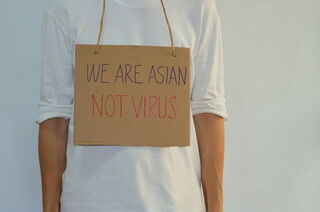Bias
A Significant Rise in Racism Toward Asian People During COVID
Anti-Asian discrimination increases significantly during the pandemic.
Posted October 7, 2020 Reviewed by Gary Drevitch

Racial discrimination towards Asian individuals has significantly increased during the Coronavirus pandemic, write psychiatrist Justin Chen and his co-authors Emily Zhang and Cindy Liu in the latest American Journal of Public Health.
Describing the racism Asian people may face as a result of blame placed on them for the outbreak of the virus, the authors report a socially mediated "secondary contagion" of racism. Asians of all ethnicities have been “scapegoated, verbally attacked with racial slurs, coughed at, spat on, and physically assaulted”.
"Increasing reports of hateful COVID-19-related attacks on Asians in the news media mirrored political leaders’ attempts to pin blame on specific groups of people (e.g., through President Donald Trump’s early repetition of the phrase “the Chinese virus” and Representative Paul Gosar’s [R, AZ] use of the term “the Wuhan virus," the commentary states.
The Federal Bureau of Investigation had warned of an increase in hate crimes towards Asian Americans, and ‘Stop AAPI Hate’, a US site launched in March 2020 to log racist attacks on Asian Americans, received 1135 nationwide reports within two weeks. Moonshot CVE, which specialises in monitoring extremist content online, reported a 300% increase in the use of hashtags that encouraged or incited violence against China and Chinese people between February and April 2020.
It is not the first time that Asian people have been harmfully stereotyped as disease carriers, write Chen and colleagues, citing the racist trope of Asians arriving in large numbers to the US during the 19th century as the ‘Yellow Peril’, with Asian people portrayed as “dirty, diseased, sinister, sexually depraved, invasive, and perpetually foreign.” In the early 1900s, entire Chinatown neighbourhoods were quarantined and burned down as officials imposed extreme and inhumane measures to control an outbreak of bubonic plague.
In 2003, severe acute respiratory syndrome (SARS), was characterised by widespread fear and distrust towards Asian people. In January 2020, when the first cases of COVID-19 were detected in the USA, New York Chinatowns reported losing 50-70% of their business.
Experiencing racial discrimination is strongly correlated with psychological and physical health outcomes, including increased pain and disability and higher all-cause mortality (Pascoe & Richman, 2009). Chen and his co-authors predict likely implications for the health and wellbeing of Asian Americans both during and after the COVID-19 pandemic, noting that discrimination can lead to reduced accessing of health services, with Asian Americans already being among the lowest utilizers of mental health services.
Chen and his colleagues note that outside of the COVID-19 pandemic, many Asian Americans have experienced racism. Comments such as “I can’t tell you people apart” contribute to the erasure of visibility and perspectives within Asian communities, which has been described by psychologist Derald Wing Sue (2007) as an “invalidation of interethnic differences."
The authors concluded that the racism associated with COVID-19 will likely have a significantly negative impact on the health and wellbeing of Asian Americans, there are also some reasons for optimism, which include “the emergence of mechanisms for reporting and tracking incidents of racial bias, increased awareness of racism’s insidious harms and subsequent civic and political engagement by the Asian American community, and further research into resilience-promoting factors that can reduce the negative health effects of racism.”
References
Chen, J. A., et al. (2020) Potential Impact of COVID-19–Related Racial Discrimination on the Health of Asian Americans. American Journal of Public Health. doi.org/10.2105/AJPH.2020.305858
Pascoe EA, Richman LS. Perceived discrimination and health: a meta-analytic review. Psychol Bull. 2009;135(4):531– 554. https://doi.org/10.1037/a0016059
Sue, D. W., Bucceri, J., Lin, A. I., Nadal, K. L., & Torino, G. C. (2009). Racial microaggressions and the Asian American experience. Asian American Journal of Psychology, S(1), 88–101. https://doi.org/10.1037/1948-1985.S.1.88
COVID-19: conspiracy theories, hate speech and incitements to violence on Twitter (2020, April 29). Retrieved from: http://moonshotcve.com/covid-19-conspiracy-theories-hate-speech-twitter/


